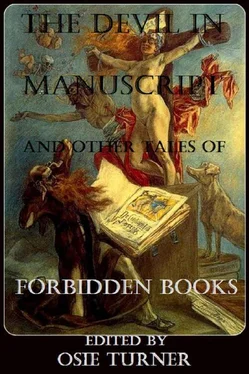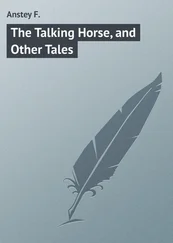Burns then began to repeat Tan O’Shanter; but was so tickled with its wit and humor—of which, however, I suspect he had but a traditionary sense—that he soon burst into a fit of chirruping laughter, succeeded by a cough, which brought this not very agreeable exhibition to a close. On the whole, I would rather not have witnessed it. It is a satisfactory idea, however, that the last forty years of the peasant poet’s life have been passed in competence and perfect comfort. Having been cured of his bardic improvidence for many a day past, and grown as attentive to the main chance as a canny Scotsman should be, he is now considered to be quite well off as to pecuniary circumstances. This, I suppose, is worth having lived so long for.
I took occasion to inquire of some of the countrymen of Burns in regard to the health of Sir Walter Scott. His condition, I am sorry to say, remains the same as for ten years past; it is that of a hopeless paralytic, palsied not more in body than in those nobler attributes of which the body is the instrument. And thus he vegetates from day to day and from year to year at that splendid fantasy of Abbotsford, which grew out of his brain, and became a symbol of the great romancer’s tastes, feelings, studies, prejudices, and modes of intellect. Whether in verse, prose, or architecture, he could achieve but one thing, although that one in infinite variety. There he reclines, on a couch in his library, and is said to spend whole hours of every day in dictating tales to an amanuensis,—to an imaginary amanuensis; for it is not deemed worth any one’s trouble now to take down what flows from that once brilliant fancy, every image of which was formerly worth gold and capable of being coined. Yet Cunningham, who has lately seen him, assures me that there is now and then a touch of the genius,—a striking combination of incident, or a picturesque trait of character, such as no other man alive could have bit off,—a glimmer from that ruined mind, as if the sun had suddenly flashed on a half-rusted helmet in the gloom of an ancient ball. But the plots of these romances become inextricably confused; the characters melt into one another; and the tale loses itself like the course of a stream flowing through muddy and marshy ground.
For my part, I can hardly regret that Sir Walter Scott had lost his consciousness of outward things before his works went out of vogue. It was good that he should forget his fame rather than that fame should first have forgotten him. Were he still a writer, and as brilliant a one as ever, he could no longer maintain anything like the same position in literature. The world, nowadays, requires a more earnest purpose, a deeper moral, and a closer and homelier truth than he was qualified to supply it with. Yet who can be to the present generation even what Scott has been to the past? I had expectations from a young man,—one Dickens,—who published a few magazine articles, very rich in humor, and not without symptoms of genuine pathos; but the poor fellow died shortly after commencing an odd series of sketches, entitled, I think, the Pickwick Papers. Not impossibly the world has lost more than it dreams of by the untimely death of this Mr. Dickens.
Whom do you think I met in Pall Mall the other day? You would not hit it in ten guesses. Why, no less a man than Napoleon Bonaparte, or all that is now left of him,—that is to say, the skin, bones, and corporeal substance, little cocked hat, green coat, white breeches, and small sword, which are still known by his redoubtable name. He was attended only by two policemen, who walked quietly behind the phantasm of the old ex-emperor, appearing to have no duty in regard to him except to see that none of the light-fingered gentry should possess themselves of thee star of the Legion of Honor. Nobody save myself so much as turned to look after him; nor, it grieves me to confess, could even I contrive to muster up any tolerable interest, even by all that the warlike spirit, formerly manifested within that now decrepit shape, had wrought upon our globe. There is no surer method of annihilating the magic influence of a great renown than by exhibiting the possessor of it in the decline, the overthrow, the utter degradation of his powers,—buried beneath his own mortality,—and lacking even the qualities of sense that enable the most ordinary men to bear themselves decently in the eye of the world. This is the state to which disease, aggravated by long endurance of a tropical climate, and assisted by old age,—for he is now above seventy,—has reduced Bonaparte. The British government has acted shrewdly in retransporting him from St. Helena to England. They should now restore him to Paris, and there let him once again review the relics of his armies. His eye is dull and rheumy; his nether lip hung down upon his chin. While I was observing him there chanced to be a little extra bustle in the street; and he, the brother of Caesar and Hannibal,—the great captain who had veiled the world in battle-smoke and tracked it round with bloody footsteps,—was seized with a nervous trembling, and claimed the protection of the two policemen by a cracked and dolorous cry. The fellows winked at one another, laughed aside, and, patting Napoleon on the back, took each an arm and led him away.
Death and fury! Ha, villain, how came you hither? Avaunt! or I fling my inkstand at your head. Tush, tusk; it is all a mistake. Pray, my dear friend, pardon this little outbreak. The fact is, the mention of those two policemen, and their custody of Bonaparte, had called up the idea of that odious wretch—you remember him well—who was pleased to take such gratuitous and impertinent care of my person before I quitted New England. Forthwith up rose before my mind’s eye that same little whitewashed room, with the iron-grated window,—strange that it should have been iron-grated!—where, in too easy compliance with the absurd wishes of my relatives, I have wasted several good years of my life. Positively it seemed to me that I was still sitting there, and that the keeper—not that he ever was my keeper neither, but only a kind of intrusive devil of a body-servant—had just peeped in at the door. The rascal! I owe him an old grudge, and will find a time to pay it yet. Fie! fie! The mere thought of him has exceedingly discomposed me. Even now that hateful chamber—the iron-grated window, which blasted the blessed sunshine as it fell through the dusty panes and made it poison to my soul-looks more distinct to my view than does this my comfortable apartment in the heart of London. The reality—that which I know to be such—hangs like remnants of tattered scenery over the intolerably prominent illusion. Let us think of it no more.
You will be anxious to hear of Shelley. I need not say, what is known to all the world, that this celebrated poet has for many years past been reconciled to the Church of England. In his more recent works he has applied his fine powers to the vindication of the Christian faith, with an especial view to that particular development. Latterly, as you may not have heard, he has taken orders, and been inducted to a small country living in the gift of the Lord Chancellor. Just now, luckily for me, he has come to the metropolis to superintend the publication of a volume of discourses treating of the poetico-philosophical proofs of Christianity on the basis of the Thirty-nine Articles. On my first introduction I felt no little embarrassment as to the manner of combining what I had to say to the author of Queen Mali, the Revolt of Islam, and Prometheus Unbound with such acknowledgments as might be acceptable to a Christian minister and zealous upholder of the Established Church. But Shelley soon placed me at my ease.
Standing where he now does, and reviewing all his successive productions from a higher point, he assures me that there is a harmony, an order, a regular procession, which enables him to lay his hand upon any one of the earlier poems and say, “This is my work,” with precisely the same complacency of conscience wherewithal he contemplates the volume of discourses above mentioned. They are like the successive steps of a staircase, the lowest of which, in the depth of chaos, is as essential to the support of the whole as the highest and final one resting upon the threshold of the heavens. I felt half inclined to ask him what would have been his fate had he perished on the lower steps of his staircase, instead of building his way aloft into the celestial brightness.
Читать дальше












